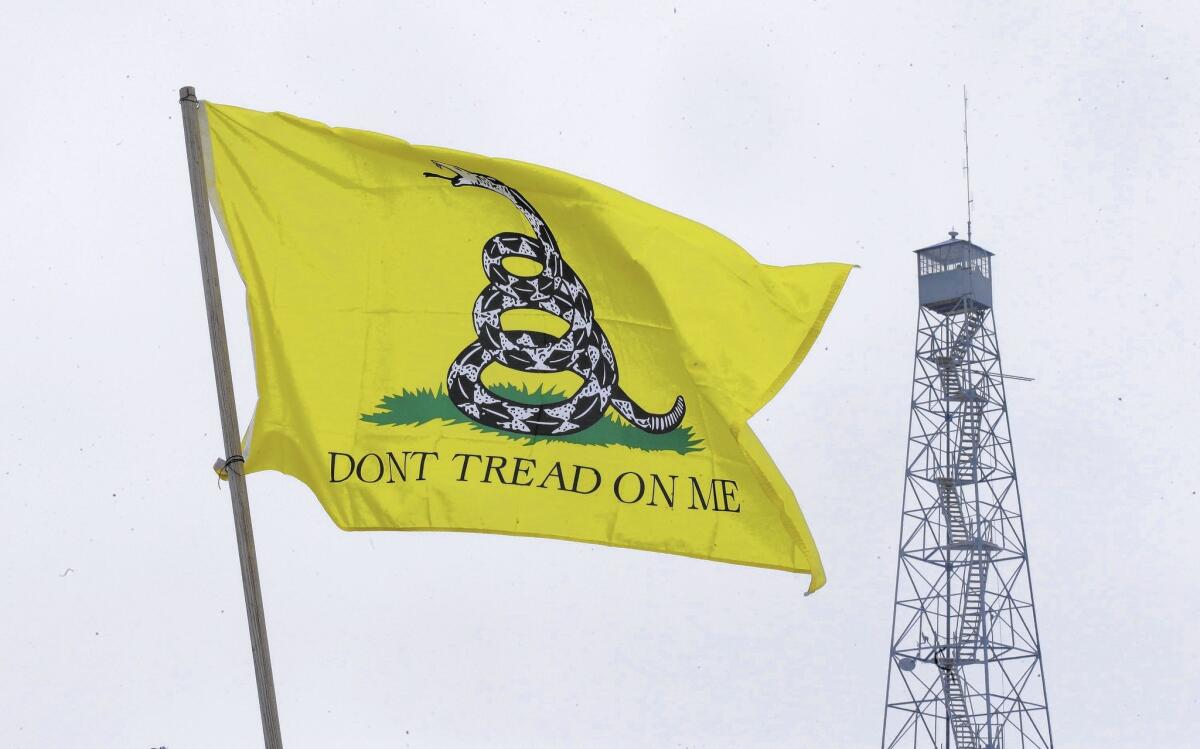Two weeks in, the Oregon refuge standoff is stuck ‘in limbo’

The Gadsden flag flies at the entrance of the Malheur National Wildlife Refuge, near Burns, Ore. An armed group has been occupying the refuge since Jan. 2.
- Share via
Reporting from MALHEUR NATIONAL WILDLIFE REFUGE — The rancher arrived with the evening snowfall. He wore a white hat, a silk scarf and a face carved with Western credibility. The Bundy brothers were not expecting him, but they had a problem he thought he could help solve.
On the one hand, their armed standoff, deep into its second week, had gained an air of stability. Over at the bunkhouse, pork and potato salad donated by a hay farmer were being served.
A man whose military clothing had a patch that read “MILITIA” cleaned an antique Russian rifle. Another had put aside his assault weapon to strum a guitar and bellow something not complimentary of President Obama into a camera streaming live on YouTube. Hellboy, the horse that has become the standoff’s unofficial mascot and irresistible camera bait, warmed in a stable.
Across the compound, hunkered in the wildlife offices they have claimed as their headquarters, the Bundy brothers welcomed their visitor’s assistance.
“We’re kind of in limbo,” Ammon Bundy, the bearded leader of the occupation, told the rancher.
The Malheur National Wildlife Refuge in Oregon, where scores of bird species and other fauna live on nearly 200,000 acres, has become a different kind of refuge this winter — a place where the Bundys and the self-appointed militia protecting them have settled in but also appear increasingly confined.
Bundy explained the problem: The media were portraying them as “gun-toting mean guys who are only here for ourselves.” His solution: They want to go into the nearby town of Burns so they can talk directly to the people they say they are trying to protect from the federal government — the residents of Harney County.
They also would explain why they have led an armed occupation of this remote refuge in southeast Oregon, he said, and outline the terms under which they would leave peacefully.
See more of our top stories on Facebook >>
The trouble is that the people of Harney County, at least through their elected leaders, including Judge Steven Grasty, the chairman of the county commission, have refused to allow the Bundys and their supporters to use the fairgrounds or any other county space. The Bundys had hoped to hold a meeting Friday but canceled because they had no place to meet.
Although they took over a federal facility, they have been unable to command a county site.
“How can I help?” the rancher asked the Bundys.
“Get us a venue,” they told him. “Get us a building.”
To hear the brothers tell it, the people would rally around their simple goal: transfer federal lands to local control. Let the county decide where ranchers can graze their cattle, where loggers can cut down trees, where farmers can draw water.
In the end, Bundy said, “the county becomes the administrative body that has jurisdiction over all the public lands.”
As his brother, Ryan, put it: Make Harney “a federal-free county.”
The rancher is among those who like the idea, though he is not as optimistic it could happen.
“I would go for a federal-free county, yes,” he said. “Something will happen from this exposure we’re getting.”
But what that something will be is hard to say. Local and federal officials haven’t tried to force out the protesters, though they’ve asked them to vacate more than once. The occupiers have bivouacked here since Jan. 2 in a compound that includes offices, a bunkhouse and support buildings.
NEWSLETTER: Get the day’s top headlines from Times Editor Davan Maharaj >>
They’ve gone through files, apparently looking for proof of federal malfeasance, and this week used U.S. Fish and Wildlife Service equipment to tear up a fence so that cattle could graze in the refuge. The move didn’t quite rally the populace. The man whose property abuts the refuge sent out ranch hands to repair the fence.
The rancher with the silk scarf has been here since the 1960s and also grazes cattle on land adjacent to the refuge. He said he had seen ranching families give up under the burden of federal restrictions, including the Hammonds, the father and son from Harney County whose imprisonment for setting fire to federal lands is among the issues that brought the Bundys and others here.
The rancher is active in the county and on a first-name basis with Grasty and the other commissioners. He agreed to let a reporter join his meeting with the Bundys on the condition that he not be identified.
His idea to end the occupation: form a coalition between ranchers and local government — “15 to 20 men” — who “would mediate this thing.”
“We’ve got to take our country back, and this is the way we can do it,” he said. “The government is not just going to give us the keys.”
The Bundys agreed, of course.
The Bundy family, backed by armed militiamen, did not back down in 2014 in a standoff over ranching fees with federal officials in Nevada.
“This is the way all wars have happened: The land and the resources get so controlled by one entity and not available to the people that the people get frustrated and then they end up retaliating,” Ammon Bundy said. “So this is a peaceful effort to make sure that that doesn’t happen.”
Peaceful? What about the young guys carrying semiautomatic weapons at the top of the hill?
“That’s ridiculous that you would connect walking around with arms to violence,” Ammon Bundy told a reporter. “That’s what keeps it peaceful.”
Someone else in the room named Rosa Parks as a role model. The rancher invoked Martin Luther King Jr.
“You know what happens when people protest?” Ammon Bundy said. “They get beat. They get sprayed with mace, they get handcuffed with zip ties. They get abused in all kinds of different ways. The 1st Amendment right was meant to be expressed with the 2nd Amendment right. Government should not come down upon a people that are protesting for their rights and beat them up. And we’re not going to allow that to happen.
“We’re not going to get beat up. We’re not dumb.”
Back at the bunkhouse, there appeared to be about 40 people coming and going to dinner. Signs outside said “No alcohol” and “No smoking.” There was no prohibition on firearms.
The mood was light and people greeted one another warmly, even though most had met just recently. They seemed to revel in the alternate world they had created. This will be bigger than anyone outside understands, they said. Just look at the supply room where shelves were piled high with provisions sent in by supporters — beans and beef, Saltines and cans of sweet corn.
The guy playing the guitar said that his name was Scotty Willingham but that he sometimes went by Scotty Wills, “like Bob Wills,” the old Western bandleader. On a whiteboard mounted next to an American flag in the living room, he had written, “If you are not willing to die for what you believe in … then you are living for nothing.”
Willingham said he had lived in Leadville, Colo., and worked as a property manager but left it all behind to join the Bundys. More people would come, he promised. And if something happened, well, just watch.
“Within an hour,” he said, gesturing to the luminous white hills, “we could have 1,000 people here.”
Twitter: @yardleyLAT
ALSO:
A behind-the-scenes look at a Rams’ proposal the NFL couldn’t refuse
Explosion risk stalls plan to capture and burn gas from Porter Ranch leak
Her lead all but gone in Iowa, Hillary Clinton deploys Bill to win over voters
More to Read
Sign up for Essential California
The most important California stories and recommendations in your inbox every morning.
You may occasionally receive promotional content from the Los Angeles Times.











